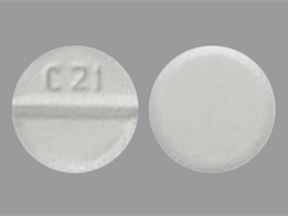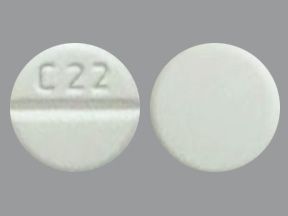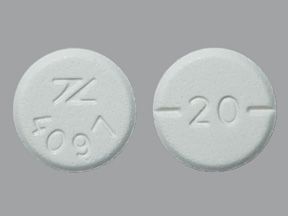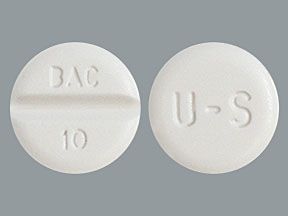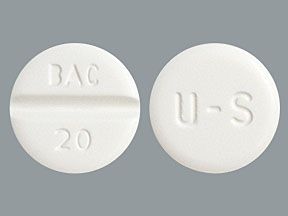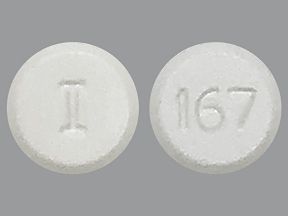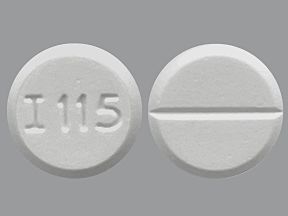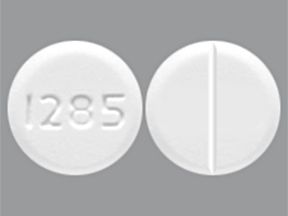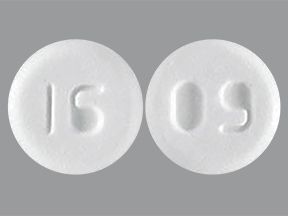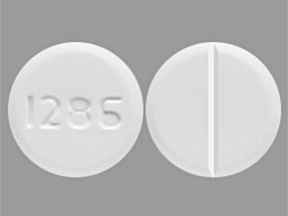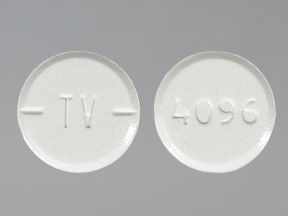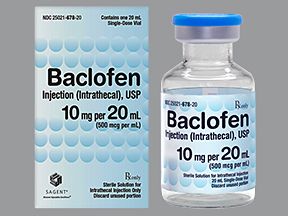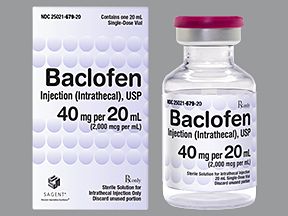Highlights for baclofen
- Baclofen oral tablet is only available as a generic drug.
- Baclofen only comes as a tablet you take by mouth.
- Baclofen is used to treat muscle spasms.
Stopping baclofen
Don’t stop taking this drug without talking to your doctor. Stopping it suddenly can cause seizures and hallucinations (seeing or hearing something that’s not real). If you need to stop taking this drug, your doctor will slowly lower your dosage over time.
Drowsiness warning
This drug can cause drowsiness. Don’t drive, use machinery, or do other dangerous activities until you know how it affects you. Also, don’t drink alcohol or take other medications that may make you feel drowsy while using baclofen. It may make your drowsiness worse.
Baclofen oral tablet is a prescription drug that’s only available in a generic form. There is no brand-name version available.
Baclofen also comes as a spinal injection, which is only given by a healthcare provider.
Why it’s used
Baclofen is used to treat muscle spasms. It may be used as part of a combination therapy. This means you may need to take it with other medications.
How it works
Baclofen belongs to a class of drugs called muscle relaxers. A class of drugs is a group of medications that work in a similar way. These drugs are often used to treat similar conditions.
It isn’t known exactly how baclofen works to treat painful muscle spasms. It’s thought that baclofen blocks the signals from your nervous system that tell your muscles to spasm.
Baclofen oral tablet drug may cause drowsiness. It may also cause other side effects.
More common side effects
The more common side effects of baclofen oral tablet can include:
If these effects are mild, they may go away within a few days or a couple of weeks. If they’re more severe or don’t go away, talk to your doctor or pharmacist.
Serious side effects
Call your doctor right away if you have serious side effects. Call 911 if your symptoms feel life-threatening or if you think you’re having a medical emergency. Serious side effects and their symptoms can include the following:
- withdrawal symptoms, such as hallucinations and seizures
- feeling very drowsy
- agitation
- trouble urinating
Disclaimer: Our goal is to provide you with the most relevant and current information. However, because drugs affect each person differently, we cannot guarantee that this information includes all possible side effects. This information is not a substitute for medical advice. Always discuss possible side effects with a healthcare provider who knows your medical history.
Baclofen oral tablet can interact with other medications, vitamins, or herbs you may be taking. An interaction is when a substance changes the way a drug works. This can be harmful or prevent the drug from working well.
To help avoid interactions, your doctor should manage all of your medications carefully. Be sure to tell your doctor about all medications, vitamins, or herbs you’re taking. To find out how this drug might interact with something else you’re taking, talk to your doctor or pharmacist.
Examples of drugs that can cause interactions with baclofen are listed below.
Central nervous system depressants
If you take these drugs with baclofen, you may have increased drowsiness. Examples of these drugs include:
- benzodiazepines, such as triazolam and midazolam
- narcotics, such as oxycodone and codeine
Disclaimer: Our goal is to provide you with the most relevant and current information. However, because drugs interact differently in each person, we cannot guarantee that this information includes all possible interactions. This information is not a substitute for medical advice. Always speak with your healthcare provider about possible interactions with all prescription drugs, vitamins, herbs and supplements, and over-the-counter drugs that you are taking.
This drug comes with several warnings.
Allergies
Baclofen can cause a severe allergic reaction. Symptoms can include trouble breathing and swelling of your throat or tongue.
If you have an allergic reaction, call your doctor or local poison control center right away. If your symptoms are severe, call 911 or go to the nearest emergency room.
Don’t take this drug again if you’ve ever had an allergic reaction to it. Taking it again could be fatal (cause death).
Alcohol interaction
The use of drinks that contain alcohol can increase your risk of nervous system side effects such as drowsiness, dizziness, and difficulty concentrating on tasks from baclofen. If you drink alcohol, talk to your doctor before mixing with baclofen.
Warnings for people with certain health conditions
For people with epilepsy: Talk to your doctor about whether this drug is safe for you. Baclofen may make your seizure control worse.
For people with kidney problems: If you have kidney problems or a history of kidney disease, you may not be able to clear this drug from your body well. This may increase the levels of baclofen in your body and cause more side effects. If you have kidney disease, your doctor may start you at a lower dose.
For people with a history of stroke: If you’ve had stroke, you may have more side effects with baclofen. This drug may also not work for your muscle spasms.
Warnings for other groups
For pregnant women: It isn’t known if baclofen is safe and effective for use in pregnant women. Tell your doctor if you’re pregnant or plan to become pregnant. Baclofen should be used during pregnancy only if the potential benefit justifies the potential risk.
Call your doctor right away if you become pregnant while taking this drug.
For women who are breastfeeding: It isn’t known if baclofen passes into breast milk. If it does, it may cause side effects in a child who is breastfed. Talk to your doctor if you breastfeed your child. You may need to decide whether to stop breastfeeding or stop taking this medication.
For children: This medication hasn’t been studied and shouldn’t be used in children younger than 12 years of age.
This dosage information is for baclofen oral tablet. All possible dosages and drug forms may not be included here. Your dosage, drug form, and how often you take the drug will depend on:
- your age
- the condition being treated
- how severe your condition is
- other medical conditions you have
- how you react to the first dose
Forms and strengths
Generic: Baclofen
- Form: oral tablet
- Strengths: 10 milligrams (mg), 20 mg
Dosage for muscle spasms
Adult dosage (ages 18 years and older)
- Typical starting dosage. You should start taking this drug on the following schedule:
- Days 1 through 3: Take 5 mg three times per day.
- Days 4 through 6: Take 10 mg three times per day.
- Days 7 through9: Take 15 mg three times per day.
- Days 10 through 12: Take 20 mg three times per day.
- Dosage increases. Your doctor will slowly increase your dosage every three days. Your doctor may further increase your dosage if needed.
- Maximum dosage. A total of 80 mg per day taken in four divided doses of 20 mg each.
Child dosage (ages 12 to 17 years)
- Typical starting dosage. You should start taking this drug on the following schedule:
- Days 1 through 3: Take 5 mg three times per day.
- Days 4 through 6: Take 10 mg three times per day.
- Days 7 through 9: Take 15 mg three times per day.
- Days 10 through 12: Take 20 mg three times per day.
- Dosage increases. Your doctor will slowly increase your dosage every three days. Your doctor may further increase your dosage if needed.
- Maximum dosage. A total of 80 mg per day taken in four divided doses of 20 mg each.
Child dosage (ages 0 to 11 years)
This medication hasn’t been studied in children. It shouldn’t be used in people younger than 12 years.
Dosage warnings
The manufacturer of this drug recommends that you don’t take more than 80 mg per day.
Disclaimer: Our goal is to provide you with the most relevant and current information. However, because drugs affect each person differently, we cannot guarantee that this list includes all possible dosages. This information is not a substitute for medical advice. Always speak with your doctor or pharmacist about dosages that are right for you.
Baclofen oral tablet is used for either short-term or long-term treatment. It comes with serious risks if you don’t take it as prescribed.
If you stop taking the drug suddenly or don’t take it at all: Your muscle spasms won’t get better and may get worse.
If you miss doses or don’t take the drug on schedule: Your medication may not work as well or may stop working completely. For this drug to work well, a certain amount needs to be in your body at all times.
If you take too much: You could have dangerous levels of the drug in your body. Symptoms of an overdose of this drug include:
- vomiting
- muscle weakness
- coma (being unconscious for a long time)
- stopped breathing
- seizure
If you think you’ve taken too much of this drug, call your doctor or local poison control center. If your symptoms are severe, call 911 or go to the nearest emergency room right away.
What to do if you miss a dose: Take your dose as soon as you remember. But if you remember just a few hours before your next scheduled dose, take only one dose. Never try to catch up by taking two doses at once. This could result in dangerous side effects.
How to tell if the drug is working: You should have less pain and stiffness.
Keep these considerations in mind if your doctor prescribes baclofen oral tablet for you.
General
- You can take baclofen with or without food.
- If the drug upsets your stomach, try taking it with food or milk.
- You can split or crush the tablet.
Storage
- Store baclofen at room temperature. Keep it between 68°F and 77°F (20°C and 25°C).
- Don’t store this medication in moist or damp areas, such as bathrooms.
Refills
A prescription for this medication is refillable. You shouldn’t need a new prescription for this medication to be refilled. Your doctor will write the number of refills authorized on your prescription.
Travel
When traveling with your medication:
- Always carry your medication with you. When flying, never put it into a checked bag. Keep it in your carry-on bag.
- Don’t worry about airport X-ray machines. They can’t hurt your medication.
- You may need to show airport staff the pharmacy label for your medication. Always carry the original prescription-labeled box with you.
- Don’t put this medication in your car’s glove compartment or leave it in the car. Be sure to avoid doing this when the weather is very hot or very cold.
Clinical monitoring
Your doctor will likely monitor certain health issues. This can help make sure you stay safe while you take this drug.
Your doctor may do blood tests to check how well your kidneys are working. If your kidneys aren’t working well, your doctor may lower your dosage of this drug.
There are other drugs available to treat your condition. Some may be better suited for you than others. Talk to your doctor about other drug options that may work for you.
Disclaimer: Healthline has made every effort to make certain that all information is factually correct, comprehensive, and up-to-date. However, this article should not be used as a substitute for the knowledge and expertise of a licensed healthcare professional. You should always consult your doctor or other healthcare professional before taking any medication. The drug information contained herein is subject to change and is not intended to cover all possible uses, directions, precautions, warnings, drug interactions, allergic reactions, or adverse effects. The absence of warnings or other information for a given drug does not indicate that the drug or drug combination is safe, effective, or appropriate for all patients or all specific uses.

